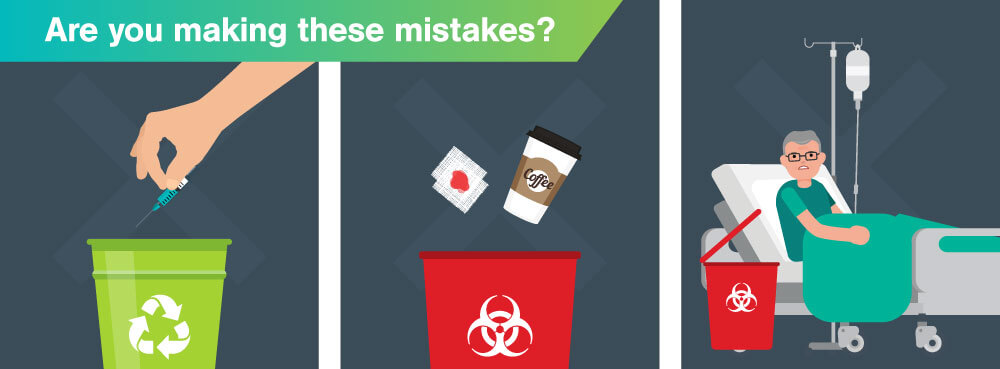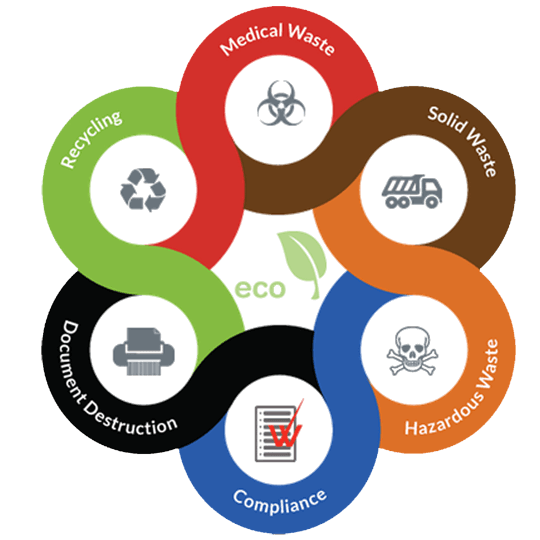Cost-efficient Medical Waste Disposal Services for Facilities and Hospitals
Cost-efficient Medical Waste Disposal Services for Facilities and Hospitals
Blog Article
Navigating Medical Garbage Disposal: Essential Services for Health Care Facilities
Medical care centers, whether huge health centers or small facilities, are entrusted with the responsibility of handling, treating, and disposing of a broad range of clinical waste streams. Recognizing the crucial solutions that sustain clinical waste disposal is not simply an issue of conformity however also an essential element in safeguarding public wellness and ecological health.
Regulatory Compliance Assistance
For healthcare facilities, guaranteeing regulative conformity assistance is vital to keep appropriate handling and disposal of clinical waste. By partnering with regulatory conformity experts, medical care facilities can stay current on developing policies, alleviate risks connected with inappropriate waste disposal, and ultimately add to a more secure and extra sustainable setting for all.
Waste Partition Advice

Health care centers need to give clear guidelines and training to team on how to set apart waste effectively. This consists of separating general waste from hazardous materials such as sharps, transmittable waste, drugs, and chemical waste. Color-coded bins, tags, and signs are frequently made use of to assist in waste partition techniques. Normal audits and surveillance of waste partition processes are important to identify any issues and make necessary enhancements.
Collection and Transportation Services

Appropriate collection and transport solutions are important parts of the medical waste disposal process in medical care facilities. These services make certain that harmful products are managed securely and in compliance with guidelines to secure both the environment and public health. Medical care facilities depend on specialized waste management firms to give efficient collection and transport solutions customized to their requirements.
Medical waste collection entails setting apart different kinds of waste at the point of generation, using color-coded bags or bins to differentiate in between basic, hazardous, pharmaceutical, and other waste streams. Once accumulated, the waste is moved in dedicated automobiles outfitted to handle unsafe materials safely.
Treatment and Disposal Solutions
In the world of medical waste disposal for healthcare facilities, after the critical stage of collection and transport solutions, the focus changes in the direction of applying reliable therapy and disposal services. Treatment services typically involve processes such as autoclaving, which makes use of steam under stress to sterilize the waste. This technique is frequently used for infectious waste that needs to be rendered non-hazardous before disposal. One more widespread therapy approach is incineration, where waste goes through high temperature levels in controlled setups to decrease its quantity and remove virus.
Disposal services encompass the last action in the medical waste management process. Recycling and resource recuperation are additionally getting traction as sustainable disposal choices for specific kinds of medical waste materials.
Reliable therapy and disposal remedies are paramount in ensuring conformity with regulations and protecting public health and wellness and the environment. Health care facilities should meticulously assess and select appropriate techniques that align with their waste monitoring goals and sustainability efforts.
Personnel Training and Education And Learning

To properly take care of clinical garbage disposal in health care centers, detailed team training and education play an essential function in making sure adherence to regulative requirements and preserving a safe atmosphere. Correct training outfits personnel with the expertise and abilities required to handle different kinds of medical waste, segregate them appropriately, hop over to here and package them securely for disposal. By enlightening staff members on the dangers connected with improper handling of medical waste, centers can reduce the probability of crashes, contamination, and regulatory violations.

Conclusion
In verdict, medical care facilities count on necessary clinical waste disposal services to make certain regulatory conformity, proper waste segregation, safe collection and transport, effective therapy and disposal, as well as team training and education click to read more and learning. These solutions play an essential duty in keeping the health and wellness and safety of both health care employees and the public, highlighting the importance of proper monitoring of medical waste in medical care settings.
For healthcare facilities, making sure regulative compliance support is important to preserve correct handling and disposal of clinical waste. Waste partition entails classifying different kinds of clinical waste to guarantee proper handling, treatment, and disposal. This includes separating general waste from hazardous materials such as sharps, infectious waste, drugs, and chemical waste.Medical waste collection involves segregating different types of waste at the point of generation, using color-coded bags or bins to identify in between general, hazardous, pharmaceutical, and various other waste streams.In the realm of clinical waste disposal for healthcare centers, after the critical stage of collection pop over to this site and transport solutions, the focus changes in the direction of implementing effective treatment and disposal options.
Report this page